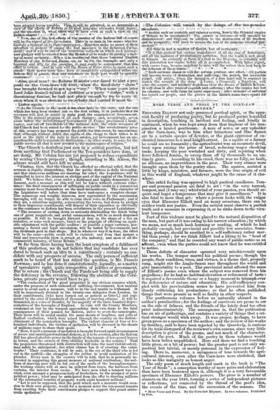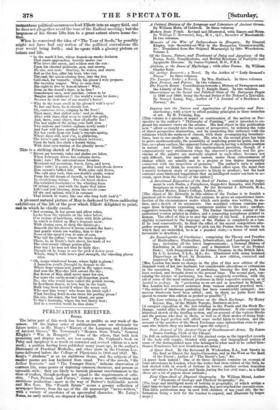310B.E TERSE ASTI) PBA§,E .. BY : RECY-31,333.* THE. C0113.i , -,I,A.W EBENEtEit.
ELLIOTT llOt only.peagelsSed poetical spirit, or the 'appa- rent faculty of pro#,upinOqtry, but he produced poems beautifu/ ia.,cleseription toii0,Mg in, incident and feeling, kindlY sentiment, when ho-waskeptraway from that bugbear -of his ima- gination a landed gentleman.' A man of- acres; or - any upholder: of -the Corn-laws, tv-aS to hint what brimstote 'artd htie 'flames. are to a certain species- of devotee, or the giant, oPPreasor of en.- • chanted innocence to a mad knight-errant. In a squire or a fernier he could see no humanity ; the agriculturist was an incarnate devil, bent upon raising the price of bread,- reducing wages checking trade, keeping the poor wretched and dirty,- • and., repieing when fever followed famine to sweep them off by thousands to an un- timely grave. According to Ins creed, there was no felly, no fault,. no islleness, no improvidence in the poor. Their very crimes were little by ki and- farmers, were the true origin of evil brought upon them s, ministers by the gentry class. The squires, assisted a. n in this world' of England a, -whatever might be the' cause of it else-
where. • • • •
This rabid feeling was cpposed to high poetical excellence. Tem- per and personal passion are fatal to art; "in- the very- torrent, tempest, and (I may say) whirlwind of your passion, you should ac- quire and beget a teniperance that may give it smoothnegs.” It is aw fatal to more than art; Where a person looks with the vulgar eyes that Ebenezer Elliott need- on many micasions, there can be neither truth nor justice. Even the satirist most observe a partial truth and a measure in expressing it, or he sinks down to the viru- lent- lampooner. Tart of this Violence must be placed to the natural dispoaition of the man, but part of it was owing to his narrow education ; by which we mean, not-so much book learning or reading, of which he had probably enough, but provincial and possibly low associates. Some- thing, perhaps, should be asaribadte a self-sufficiency rather mor- bid than, proud ; for we think -Mott had. a liking to be " head of the company," and that he resented Any want of public notice as an affront, even when the parties could. not know that he was entitled These defects of character operated very- mischievously upon. his works. The temper -marred-his political poems • -though the people, their condition, Armes, and virtues is a theme let, propepr,,ly- ming, might .stir the Anglo-Saxon race throughout the world a give immortality to a poet.. The provincial mind affected, the mass. of Elliott's poems . even where' the subject was removed -from his prejudices:- for he had noliabitual elevation or refinement of taste it required a favourable theme or a happy moment to triumph over the deficiencies of nature and- education. His self-sufficiency cou- pled with his provincialism seems-to have prevented him from. closely • criticizing his productions; so , that he often published things that were prosaic as well as faulty in other respects. The posthumous .volumes :before us naturally abound in the author's peculimities ; for the feelings of survivors are prone to err' on the side of fulness; and the friends of the lately dead too often print indiscriminately: The- eonsequenee is, that the publication has an air of gatherings, and contains a variety of things that a cri- tical stranger would wish away. It was proper, perhaps, to have given prose as aspechnen -of the author; and the review of his works. by Southey, said to have been rejected by the Quarterly, is curious for, ittotal disregardof -the reviewer's own canons, since very little description is given of the poems, and not much of the eharaoter- lades °tithe:poet. lfuch of the; poetry in these volumes would. have been better unpnblished. Here and there we find a touching- little piece, or a bit of power; but the greater part is not only an- poetical but trivial, or merely personal in the expression of feel- . There is, mereover, a savageness of tone towards the ari- ciItural_ interest, even after the Corn-laws were abolished, that looks as like malignity as honest anger. The only poem of much length and mark in the book is "The Year of $ee&"; a conception worthy of more pains and elaboration than have been bestowed upon it, although it is a very favourable specimen of Ebenezer Elliott's powers. The piece is a number of sonnets on the year 1848, forming a series of independent pictures or reflections, yet connected by the thread of the poet's idea, the events of the time, and the succession of the seasons. The
• More Verse and Prose. By the Corn-law Rhymer. In two volumes. Published by Fox.
MOnsontAins political occurrences lead Elliott into. an angry ilbid, and he does not altogether avoid the tone of the Radical meeting.; but the hugeneeis of his theme lifts him to a great extsmt.abova barna. fac-
tion.
When he conceived the idea of "The Year. of Seethi,ne possibly
might not have had any notion or the political convulinons the year would bring. forth ; and he- opens with. & gloomy picture on
Mitara. and life..
" In the marled, hut, whose flamed-upsrooke.deelareer That morn. approaches, heavily snores one Who loves the moon, and seldom sees the sun :
Uponiiia chested piekloeks, gun; and snares,
Be sits, and rinds. Starting, he wakes, and stares Rod as the fire, after his boys, who run
Through the quick-closing door, into the dun
Coldroad, for warmth; while his gloom'd.wife prepares His morning supper. Why do men deny Ifes right to live by honest labour ? Why, Even as the deserestiger, is he free ? Gamekeeper once,. now poacher, (when to be Burglar and. cutthroat?) the world's worst he dares; Because he stole one of our master's hares !
"Why do the tears swell in his gloom'd wife's eyes? To her-end hers, he- is already. lost. Oh, conscious river, crisping ur the frost ! Thou snow, that stifled echo ! and ye skies, Alive with stars, that seem to watch the glade, And; there, some object, that all ghastly lies! The last night of the dying-year hath seen Two widows and twelve orphans newly made ! And Law will have another victim soon.
Not ten. yardafrom. our Lady's wayside spring, Where daisy-rill, iced o'er, is glittering,. The lover's gate and gospel-thorn between ; Upon its- back lies stark a. horrid thing; With dead eyes staring at the-ghastly moon."
This is a striking sketch of February.
"Rivers are torrents, vales and plans-are-lakes, When February draws her curtains down. Rain! rain! The universalsnow forsakes.
Moorland and mountain, forest,. farm, and town. Rain ! rain ! it pours, it pours. Bed land-floods drown Blue occean's baffled tide. With calm cold frown, The cold grey rock, that saw-death's cradle, wakes From his old dream of drowth, to find his home In cloud-hung deluge. The old forest shakes His wrinkled forehead o'.or the whirling foam Of inland sea ; and with the baste that takes Life's sad last blessing, down the revels come Of sky and upland, miied in cataract That rioteth in wade, like one. who long bath laded."' A. pleasant natural picture of May is darkened by those saddening exhibitions. of the life of the poor whioh Elliott delighted to paint, end: in. which. he chiefly excels. "lied- evening, in her green and silver robes, Looks from the uplands on the lakes below. O'er realms of hawthorn, white with little globes In which is folded up May's fragrant snow.. With dosing eyes, to sleep the daisies go ; Beneath the fire-flower'd. broom awakes the-hare ; And gentle winds axe waiting, thin to blovr News of the open'il rose to sons of care, Who toil for coffins ! where the brave despair: There, lo, in Trade's dark street, his trade, of- wo The ever-weary village genius plies. Poor boy!' he-sees-not that he dairy dies ; Though oft he longs to see the pink'd flower grow Where, wing'd with. love's. glad strength, the wheeling plover cries.
" Oh,. many-windowed house, whose light is glnom.!
A homeless youth (brought by despair to die Where hope comes not) pants in thy upper room, And sees the May-day lark ascend the Sky; But flower of May shall never -meet his eye, Nor mate the earth-worm!aall-forgetten guest. No;. she who would have called the golden broom, Or hawthorn flower, to love him: in the tomb, Huth long been haven'd where the weary rest. Who sees him weep? who hears his latest sigh ? What hireling fiend mocka twice his parting groan? His sire, his sister, the last friend, are gone To Sin's Australia, where the bad thrive best; And in a- crowded world he dies alone."



























 Previous page
Previous page